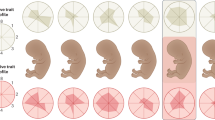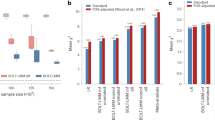Abstract
Genome-wide association studies can provide researchers some reference on gene mapping of complex trait, a key point of which is how to improve the power of association test. Recently, two-stage approaches are widely used to genome-wide association analysis. In the first stage, a screening test is used to select markers, and in the second stage, a family-based association test is performed based on a smaller set of the selected markers. Here, we modify an existing two-stage approach and propose a new test statistic for the association analysis. Simulation studies are conducted to compare the type I error rates and powers of the proposed approach with those of the existing two-stage approaches. Simulation results show that the new two-stage approach has greater power than the other two-stage approaches to some extent.
Similar content being viewed by others
Log in or create a free account to read this content
Gain free access to this article, as well as selected content from this journal and more on nature.com
or
References
Hirschhorn JN, Daly MJ : Genome-wide association studies for common diseases and complex traits. Nat Rev Genet 2005; 6: 95–108.
Risch N : Searching for genetic determinants in the new millennium. Nature 2000; 405: 847–856.
Zhang S, Zhang K, Li J, Sun FZ, Zhao H : Test of linkage and association for quantitative traits in general pedigree: the quantitative pedigree disequilibrium test. Genet Epidemiol 2001; 18: 370–375.
Satagopan JM, Verbel DA, Venkatraman ES et al: Two-stage designs for gene-disease association studies. Biometrics 2002; 58: 163–170.
Thomas D, Xie R, Gebregziabher M : Two-stage sampling designs for gene association studies. Genet Epidemiol 2004; 27: 401–414.
Morley M, Molony CM, Weber T et al: Genetic analysis of genome-wide variation in human gene expression. Nature 2004; 430: 743–747.
Steen KV, McQueen MB, Herbert A et al: Genomic screening and replication using the same data set in family-based association testing. Nat Genet 2005; 37: 683–691.
Feng T, Zhang S, Sha Q : Two-stage association tests for genome-wide association studies based on family data with arbitrary family structure. Eur J Hum Genet 2007; 15: 1169–1175.
Gu Z : Multiple-stage approach for genome-wide association studies based on data with any family structure. M.Sc. Dissertation, Harbin: Heilongjiang University, 2010,, pp 9–10.
Lange C, Lyon H, DeMeo D et al: A new powerful non-parametric two-stage approach for testing multiple phenotypes in family-based association studies. Hum Hered 2003; 56: 10–17.
Lange C, Demeo DL, Silverman E et al: Using the noninformative families in family-based association tests: a powerful new testing strategy. Am J Hum Genet 2003; 73: 801–811.
Benjamini Y, Hochberg Y : Controlling the false discovery rate: a practical and powerful approach to multiple testing. J R Stat Soc B 1995; 57: 289–300.
Akaika H : Fitting Autoregressive Models for Prediction. Ann I Stat Math 1969; 21: 243–247.
Schwarz G : Estimating the dimension of a model. Ann Stat 1978; 6: 461–464.
Acknowledgements
This research was supported by the National Natural Science Foundation of China (no. 11201129), the Natural Science Foundation of Heilongjiang Province of China (A201207), the Scientific Research Foundation of Department of Education of Heilongjiang Province of China (nos 1253G044, and 12531508) and the Scientific Foundation of Heilongjiang University for Distinguished Young Scholars (no. JCL 201003).
Author information
Authors and Affiliations
Corresponding author
Ethics declarations
Competing interests
The authors declare no conflict of interest.
Rights and permissions
About this article
Cite this article
Ma, W., Zhou, Y., Zhou, Y. et al. A modified two-stage approach for family-based genome-wide association studies. Eur J Hum Genet 22, 148–151 (2014). https://doi.org/10.1038/ejhg.2013.105
Received:
Revised:
Accepted:
Published:
Issue date:
DOI: https://doi.org/10.1038/ejhg.2013.105



